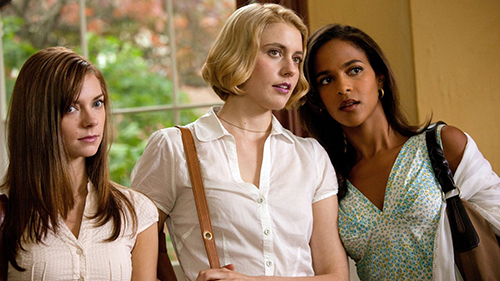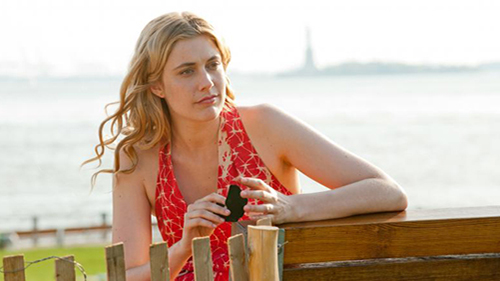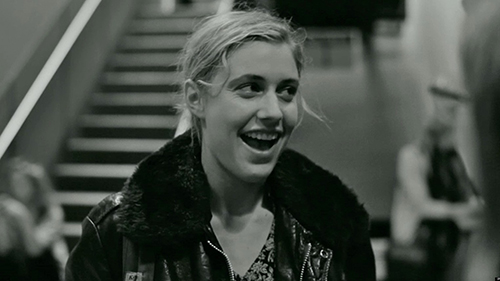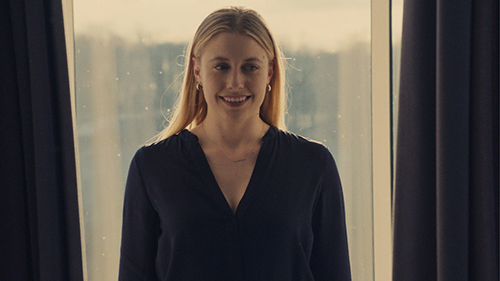Greta Gerwig: The Essential Collection
To many a filmgoer, Greta Gerwig is a staple of a realistic and character-driven strand of the American independent circuit and a recognisable face commonly present in smaller roles in more popular studio movies such as Arthur (2011) and No Strings Attached (2011). In recent years, she has risen to prominence as a key figure behind the camera, earning accolades as a screenwriter and director for her work on the Oscar-nominated films Lady Bird (2018) and Little Women (2019).
She was, in her twenties, the youthful star of the so-called ‘true American independent’ – that being movies not funded by subsidiaries of large corporations such as Fox Searchlight and Miramax – and was a driving force behind the mumblecore movement that brought to prominence a number of writer-directors working in improvisational environments such as Joe Swanberg and the Duplass brothers.
Despite being a prominent figure within the mumblecore movement and earning her stripes as an actor under larger-budget directors such as Noah Baumbach on Greenberg (2010) and Frances Ha (2013), it wasn’t until Greta Gerwig was in her early thirties that the her reputation caught up with her talent. By the time Lady Bird was released, Gerwig had as many as ten writing credits already to her name, five of which were stories or screenplays for feature-length movies. With a credit as co-director already in her repertoire from the 2008 micro-budget romantic drama Nights and Weekends, her semi-autobiographical solo directorial debut cemented her on the path to becoming one of the world’s most-beloved and most-respected filmmakers of this generation.
With bold creative choices and colourful characters exemplifying Greta Gerwig’s legacy on the big screen over the past fifteen years, hers is a catalogue of work that is easy to fall in love with and necessary to evaluate.
This is the Greta Gerwig Essential Collection: a celebration of this woman filmmaker’s capabilities to evoke unique personas, empathetic characterisations, and moving stories across all budgets and screen sizes.
“My true north is talkies about ladies.”
Greta Gerwig
Nights and Weekends (2008)
Directors: Greta Gerwig, Joe Swanberg
Writers: Greta Gerwig, Joe Swanberg
IFC Films | Film Science
Nights and Weekends was one of the more popular productions of a movement many came to refer to as ‘mumblecore’. Mumblecore was a small independent movement that occurred away from the eyes of the big studios and featured largely improvised personal stories about the everyday lives of its characters, with no issue or task considered too big or too small to put into the finished presentation.
It was called ‘mumblecore’ because, often, the sound quality was poor and the actors would improvise so much and so often that they sometimes failed to make sense. The result was an often maligned but incredibly realistic representation of everyday life through the eyes of the filmmakers, making Nights and Weekends not only the first true insight into Greta Gerwig’s filmmaking sensibility for more developed women characters, but also one of the first widely released movies to take a peer into her soul as a creator of art.
“You kiss harder than I recall… you smell the same.”
Greta Gerwig and co-writer/director Joe Swanberg play the lead characters Mattie and James, making Nights and Weekends a truly personal artistic endeavour in every sense that a movie could be considered one – they are writers, directors, producers and actors.
In the movie, the filmmaking duo play a couple trying to make a long-distance relationship work while each of them tries to forge their own way in the world via studying and/or the development of their career. This is essential to Gerwig’s catalogue for this reason: it is an ultimately personal venture that already has the makings of her true themes as a filmmaker – those being: struggling to understand who you are, wanting to find spiritual fulfilment, and longing to find a place in the world.
Here, those themes and the emotions that the character goes through are incredibly raw, as is the photography, which has since become typical of Joe Swanberg projects. This places the success or failure of the film on the shoulders of its leads, and Gerwig shines under the pressure to deliver an honest and compelling portrayal that shows, even early in her film career, exactly what she is capable of.
In an interesting side note, Joe Swanberg has revealed that the film’s very intimate sex scenes were shot at the end of filming and all but finished any possible future collaborations between the pair due to the arguments caused.
Greenberg (2010)
Director: Noah Baumbach
Writers: Noah Baumbach, Jennifer Jason Leigh
Scott Rudin Productions | Focus Features
“All the men out here dress like children and the kids dress like superheroes.”
Greenberg marked the beginning of Greta Gerwig’s collaboration with writer-director, and future partner, Noah Baumbach, the man with whom she’d go on to make several other films.
“I was thinking this morning that I’ve been out of college now for nearly as long as I was in, and nobody cares if I get up in the morning.”
What Greenberg represented to Gerwig was a coming-of-age. The actress was a lead character in a movie with huge pulling power – mostly Ben Stiller who was fresh off the back of late 2000s hits Madagascar (2005), Night At the Museum (2006), and Tropic Thunder (2008) – and was showcased as a talent, not restricted to being a simple and uninteresting device through which the plot and Stiller’s character were seen. She excelled, and despite the movie panning with audiences, the darkly humorous undertones of the film were appreciated by critics who had begun to realise Gerwig’s potential even under the weight of star power that Stiller had brought with him.
Perhaps most interesting in regards to this Essential Collection is how Greta Gerwig’s somewhat trademarked sense of shameless ownership over herself, her body and her characters was still present in this more glamorous and aesthetically-concerned film in such a way that lost none of her appeal or raw edge.
It is easy to link Gerwig’s performance in this relatively big production to the Gerwig present in the much smaller Nights and Weekends, both in terms of character portrayal and character development. Her character is lost and wanting more from life in both movies, the only major difference being that in Greenberg her character’s partner is also these things, making for a more tragically comic presentation we’ve now come to associate with all Noah Baumbach films.
Damsels in Distress (2011)
Director: Whit Stillman
Writer: Whit Stillman
Westerly Films | Sony Pictures Classics
“Seven Oaks is the last of the Select Seven to go co-ed. An atmosphere of male barbarism predominates. We’re going to change that.”
Damsels in Distress marked a departure from Gerwig’s roots in realistic and ultimately honest independent dramas as the actress led a cast including Lio Tipton and Aubrey Plaza in this Whit Stillman dark comedy about fraternities, depression and general college life in the United States.
It was a departure that gained the actress notoriety of a new kind, this time for her portrayal of the always tough to master act of dry humour. And, despite the movie’s generally outlandish nature, Gerwig and her writer-director Stillman were praised for managing to balance the comedy with true moments of emotion that were thought-provoking and even inspiring.
“There’s enough material here for a lifetime of social work.”
In an interview published by ANS on YouTube, Greta Gerwig declared that her mother (who is a ‘psych nurse’) was personally appreciative of the manner in which this movie tackled issues regarding pressure at college and the high levels of depression and suicide on campuses, which is of course to the credit of all involved with regard to its sensitive subject matter. It is this tackling of such themes that makes Damsels in Distress so interesting, and makes Gerwig’s performance a stand-out in how different it is.
This movie could have been considered a calculated risk, and was one that ultimately paid off with audiences and critics. To this day it remains a large departure from her more raw and less polished roles of years gone by, and is essential to her career per that circumstance.
Arthur (2011)
Director: Jason Winer
Writers: Peter Baynham, Steve Gordon
Warner Bros.
“If you look in the corner, you can see one dirty brick.”
Arthur is the only major studio movie that Greta Gerwig has ever held a leading role in, and for that reason alone it must be considered a part of her Essential Collection.
Jason Winer’s re-telling of the classic British movie of the same name was mostly assembled at Warner Bros with the intention of being a star vehicle for rising comedian-actor Russell Brand, the man who played the movie’s titular character. With a supporting cast that included Helen Mirren and a host of famous celebrities in cameos, the studio wanted a relatively unknown talent to play as Brand’s on-screen love interest and Greta Gerwig was cast.
Her role as Naomi is lacking in a lot of the aspects that typical Gerwig characters often excel in, and, as a result, the character and performance weren’t quite the hit that Gerwig had proven herself capable of. The filmmakers and the studio wanted a safe bet, and as such Gerwig’s performance was limited to reactions of shock and confusion – her character arc was ‘fighting off the boy she actually likes’ until she falls in love with him. Gerwig was restricted.
The typical rambling delivery and more messy elements of the Gerwig’s typical portrayals had helped to boost her appeal, but in Arthur she was limited to being an ‘alternative pretty girl’, something that Gerwig was visibly less comfortable doing.
Despite the movie being set in New York City, the same city she had (to this point) spent most of her adult life and filmed most of her movies, Gerwig was understandably lost and never really sought to capitalise on what was arguably her breakthrough mainstream role; evidence, perhaps, of her frustration at the opportunities offered within the piece.
Arthur has, as a result, become little more than a glimpse of the typical young, ‘different’ and ‘interesting’ romantic partner of a leading man that she could have become had she chosen to pursue less-personal projects as her star power shot to prominence. It is the ultimate example in Gerwig’s filmography as to why some actors and actresses shouldn’t make the move from the independents of New York to the studio system of Hollywood, an essential part of the Greta Gerwig Collection for this reason.
Lola Versus (2012)
Director: Daryl Wein
Writers: Zoe Lister-Jones, Daryl Wein
Groundswell Productions | Fox Searchlight
Fresh off their success with the understated East Coast independent film Breaking Upwards, in which writers Zoe Lister-Jones and Daryl Wein co-wrote, directed and starred, the filmmaking duo were afforded a more comfortable budget for 2012’s Lola Versus. With Gerwig making waves courtesy of Greenberg (2010) in particular, it made logical and financial sense to cast someone with her acting style and drawing power in the central role. In many ways, this marked Greta Gerwig’s return to her routes as a solid lead character actress in an understated East Coast independent passion project, and was reminiscent of her time working alongside the Duplass Brothers and Joe Swanberg.
“I think to love yourself you have to learn to love other people.”
Lola Versus wasn’t very well received, with criticisms of its over-use of ‘quirkiness’ being a major part of this. It was, for all intents and purposes, a well disguised New York rom-com which buried itself beneath a cleverly constructed character study the likes of which Gerwig had always been attracted to as an actress.
The movie’s small budget helped in many ways as the recognisable cast featuring the likes of Joel Kinnaman, Bill Pullman and Hamish Linklater among others, was set up as background noise to the focused character story we were presented with: the personal development of a late 20s woman reeling from the break-up of her engagement.
It was a role typical of her career, only this movie seemed more based in obvious humour and irony than most of her other films, something that Gerwig’s portrayal of awkwardness and doubt leant itself to in a way that makes the character endearing despite the movie lacking in other respects.
Should you want to experience Greta Gerwig’s potential as a leading woman, this would be one of the films to watch, for she offers just a little more quirk and readiness than she does in most of her other performances and is the focus of almost every single scene.
Frances Ha (2012)
Director: Noah Baumbach
Writers: Noah Baumbach, Greta Gerwig
RT Features | Scott Rudin Productions | Pine District Pictures
“I’m not messy, I’m busy.”
Every artist has a standout piece of work within their oeuvre and, for Greta Gerwig as a screen performer, Frances Ha is it.
Playing the role of Frances – a lost, confused and not-quite-adult late-20s woman – Gerwig’s entire career seemed destined for the role that she is credited as co-writing.
Gerwig did, as could be expected, perform the role of Frances with the same raw edge and almost self-deprecating honesty of her earlier years that, when combined with the New York setting, story, and the film’s black and white photography (from Sam Levy, the would-be director of photography on Lady Bird), made the movie not only the standout of her career but also one of the standout east coast independents of the decade.
“Sometimes it’s good to do what you’re supposed to do when you’re supposed to do it.”
As part two of her four-part collaboration with Noah Baumbach, and the first of their official off-screen relationship, Frances Ha radiates a trust between the two filmmakers who seem to have such an affinity with their own writing material that the presentation of it (through the framing, the edit, the acting, and so on) is given the freedom of its black and white pallet or Gerwig’s free-moving physical style.
In many ways, the movie is an authentic representation of the person Gerwig has presented herself as being throughout the years, both inside and outside of film. The story is challenging, the performance vulnerable, the photography unique and the soundtrack so very New York. What’s more is that the character is self-deprecating, dishonest with herself, lost and confused. Gerwig had been acting and writing similar characters that represented the lives of struggling women artists in their twenties for much of the previous decade, but this film seems to be the crescendo of that stage.
Importantly, for Gerwig and many of her fans who have been drawn to her as an on-screen personality over the past fifteen years or so, Frances Ha is another one of her films about young women – ‘a talkie about ladies’ – and therefore a true passion project.
Mistress America (2015)
Director: Noah Baumbach
Writers: Noah Baumbach, Greta Gerwig.
Fox Searchlight | RT Features
“She was the last cowboy. All romance and failure.”
Beginning as a free and unashamed libertarian with a taste for fine art, food and parties, Greta Gerwig’s character Brooke is seen by central protagonist Tracy (Lola Kirke) to be the embodiment of New York’s more commercial representation as a centre for arts, fun, sex and rock and roll, and even goes so far as to partake in each of these things throughout their first night together. But, as the characters grow closer and Tracy’s idolisation of her could-be sibling (via their parents’ marriage) begins to wain, Brooke becomes more grounded and vulnerable, even perhaps relatable, and the now seemingly semi-autobiographical characterisations that Gerwig’s more recent characters have displayed – being on a lost path, struggling to come to terms with adulthood, a longing for a place to belong – become apparent, the film going on to offer an interesting evolution to many of Gerwig’s previous characters, not least that of Frances in Frances Ha.
“It would feel like the home everyone would want to raise their kids in.”
Diving into her thirties with the weight of societal expectation weighing heavily on her shoulders, Greta Gerwig’s Brooke attaches her own thoughts of a free and spiritually-enlightening life to, among other things, including a TV show much like the real-life actor-writer’s failed ‘How I Met Your Mother’ spin-off ‘How I Met Your Dad’, and a project to open a New York City restaurant – an idea that has little by the way of focus and echoes the troubles that Frances was encountering in Frances Ha regarding the fight between pursuing her dreams and the all-too-adult capitalist notion of working for money that can put food on the table.
Gerwig herself described Brooke during an interview with AOL BUILD as being “super performative and always putting on a show”, expanding to describe her as ‘living in a movie that’s in her head’. This somehow manages to make her character both dislikable and completely relatable at the same time, and gifts Gerwig the chance to push through lengthy monologues that seem to come more often than in any of her other Noah Baumbach collaborations.
From a writer and producers perspective, this movie showcases the focus that Greta Gerwig shares with Noah Baumbach regarding the stories they want to tell and the themes they wish to present. It’s an artistic ‘New York film’ in every sense of the word, from its intriguing synth soundtrack that pays homage to the 80s movies that served as the film’s inspiration, to its hopeful representation of despair and anxiety, right through to its semi-autobiographical and subtly humorous story and its colourful yet focused presentation.
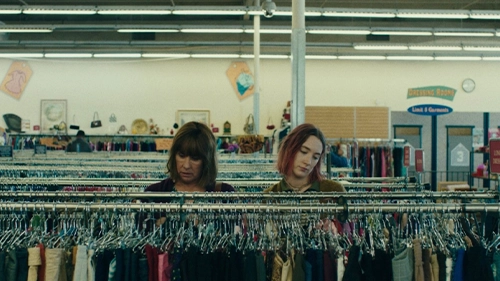
Lady Bird (2017)
Director: Greta Gerwig
Writer: Greta Gerwig
A24 | Universal | Focus Features
In Mistress America, Greta Gerwig stepped away from the spotlight to become a supporting character, and in Lady Bird she removed herself from it altogether, focusing exclusively on the writing and directing of this intimate and personal semi-autobiographical coming-of-age film.
“I want you to be the very best version of yourself that you can be.” – “What if this is the best version?”
This was Greta Gerwig’s big introduction to the mainstream. Lady Bird touched many a woman who was going through, or had been through, the trials and tribulations of growing up, dealing with family drama, and wanting to be self-dependent but having no idea how to do that. The film was nominated for five Academy Awards, including the 2018 Best Picture and individual nods for Gerwig’s work in both the Director and Screenplay categories.
Unsurprisingly, Lady Bird featured all the hallmarks of Gerwig’s earlier work. The story was densely packed with emotion and relatability, and the kinds of quirks Gerwig had long portrayed across her acting career. The direction was steady, like that of a much more experienced hand, capturing the simplicity of teenage life like few had done before. She worked with Frances Ha director of photography Sam Levy to photograph her Californian hometown, and cast the generation-defining awards favourite Saoirse Ronan as the movie version of herself.
This was a film about relationships. Friends, boyfriends, mothers, fathers. It felt as real as those low-budget camcorder movies she had started in, but it looked like the more expensive and timeless work she’d starred in under Noah Baumbach. This film was raw and at times a bit dirty, and at others was representative of many of Gerwig’s hopeful and daydreaming lead characters. Lady Bird was the culmination – the ultimate representation of Greta Gerwig’s journey as an artist.
Greta Gerwig has long been a filmmaker who strives to share the troubles of her generation and gender through her art. Her performances have been honest and raw, and seem completely unique to her, while her passion to craft stories of her own seems to take prominence over celebrity and financial success. She is, head to toe, an artist of cinema; a self-titled author of the moving picture art form. Perhaps most importantly, she has striven to achieve her own visions no matter how far away from the studio system they may come to life, and her continued passion to empower women in the industry make her an admirable and inspirational filmmaker whose work outlined in this collection will likely be appreciated by any like-minded reader of this piece for generations to come.
Updated 14th July 2023. Originally published 1st July 2016.



